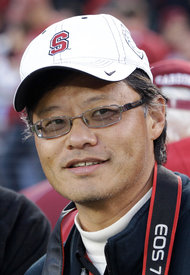 Paul Sakuma/Associated PressYahoo’s co-founders, Jerry Yang, right, and David Filo, own about 10 percent of the company.
Paul Sakuma/Associated PressYahoo’s co-founders, Jerry Yang, right, and David Filo, own about 10 percent of the company.
11:58 p.m. | Updated
Yahoo’s directors are leaning toward selling a minority stake in the company to an investor group instead of selling the business outright, after a meeting of the company’s board on Wednesday, according to people briefed on the matter.
But that decision could alienate shareholders and leave the troubled Web pioneer vulnerable to potential takeover bids, including one that may come from its Asian partners, the Alibaba Group of China and Softbank of Japan.
This week, Yahoo received two proposals for a minority investment of roughly 20 percent, one from TPG Capital and one from an investor group led by Silver Lake. The bids were close in value, with Silver Lake offering about $16.60 a share and TPG about $1 a share more, two people briefed on the matter said.
Beyond price, Yahoo’s board is also assessing the proposals based on the composition of the investor groups and how the firms would be able to bolster Yahoo’s product and financial strategies.
The Silver Lake group, which includes Microsoft, has been working with Andreessen Horowitz, the venture capital firm led by the Netscape co-founder Marc Andreessen.
The proposal includes a plan to pay out shareholders and dispose of Yahoo’s Asian holdings, as well as installing a new chief executive and revamping its board. The Silver Lake group is requesting three seats on the Yahoo board, including one that could be for Mr. Andreessen.
TPG has held discussions with Greylock Partners, another venture capital firm, about a possible alignment, two people said. TPG is hoping to draw on the expertise of Reid Hoffman, one of Greylock’s partners and the founder of the professional social network LinkedIn, these people said. They asked for anonymity because they were not authorized to speak publicly about confidential discussions.
Both investor groups are betting that bringing on a respected Silicon Valley executive would help energize Yahoo’s beleaguered troops and yield a compelling strategic vision for the company.
Though Yahoo seems to be making progress toward a deal, the process has also exposed how fractured the company’s board is, people close to Yahoo said. According to these people, board members have disagreed on the company’s strategic vision; which investor group should lead a minority investment, if the company chooses that path; and what role Yahoo’s founder and former chief executive, Jerry Yang, should play in a transaction.
Some on Yahoo’s board have favored TPG’s bid and encouraged the buyout firm to find a partner like Greylock, as a counter to Silver Lake’s close relationship with Andreessen Horowitz, one person close to the company said.
Yahoo and the investment firms declined to comment.
Yahoo will also have to contend with a possible takeover bid led by other private equity firms, Alibaba and Softbank. The Asian companies have been in talks with the Blackstone Group and Bain Capital, as well as other buyout firms, about together forming a bid for all of Yahoo, according to people briefed on those talks.
Such a bid would most likely value Yahoo higher than either offer from Silver Lake or TPG. Some members of the potential Blackstone-Bain group are contemplating a bid that could value Yahoo at more than $20 a share, one of these people said.
But discussions appear to be continuing on whether to make a takeover bid. “Alibaba Group has not made a decision to be part of a whole company bid for Yahoo,” John Spelich, a spokesman for the company, said in a statement.
Taking over Yahoo would allow Alibaba and Softbank to reclaim Yahoo’s minority stakes in their businesses, while giving private equity firms control of the remaining American operations. Yahoo owns about a 40 percent stake in Alibaba and a 35 percent stake in Yahoo Japan, which is controlled by Softbank.
Last month, Alibaba and Softbank presented Yahoo with a complex proposal to buy out its stakes in the two companies. The plan would essentially involve spinning off the stakes to Alibaba and Softbank without incurring a big tax bill. Since then, however, Yahoo has not had substantive talks with the two companies, one of the people briefed on the talks said.
While Alibaba and Softbank would prefer to enter friendly talks with Yahoo over buying back the holdings, the two see an unsolicited hostile takeover bid as a last-ditch option.
Other parties have also expressed interest in investing in Yahoo, including Kohlberg Kravis Roberts, Hellman Friedman, Providence Equity and THL Partners.
The investor groups expect to receive feedback from Yahoo’s board by the end of the week, one person said.
If Yahoo pursues a minority investment backed by private equity, the company would probably take on debt to finance a stock buyback. The winning investor group’s shares would then be aligned with the roughly 10 percent stake that is held by Yahoo’s co-founders, Mr. Yang and David Filo, effectively giving the group majority control.
However, that structure also gives Mr. Yang outsize influence over a large voting block, a concern for some on Yahoo’s board, two people said.
The minority-stake ideas have drawn the ire of several shareholders, who are worried that it would diminish the value of common stock and their voting power. One vocal critic, Daniel S. Loeb, the hedge fund manager of Third Point, has called for the dismissal of Mr. Yang as a director and urged the board to pursue a full sales process.
Article source: http://feeds.nytimes.com/click.phdo?i=85bcdb1c9938f31410bf826211479ab9

